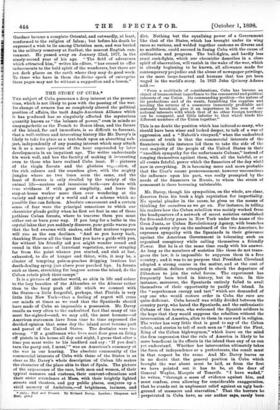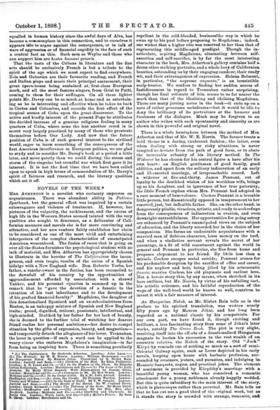THE STORY OF CUBA.*
THE subject of Cuba possesses a deep interest at the present time, which is not likely to pass with the passing of the war. Its change of owners has so completely altered the political position of affairs, the tacit Anglo-American Alliance which it has produced has so singularly affected the mysterious quantity known as "the balance of power," even in minds so unsympathetic as the French to Saxon ideas, and the future of the island, far and immediate, is so difficult to forecast, that a well-written and interesting history like Mr. Davey's is likely to take its place as a text-book upon an absorbing sub- ject, independently of any passing interest which may attach to it as a mere question of the hour superseded by later developments in an impatient age. The writer understands his work well, and has the faculty of making it interesting even to those who have realised Cuba least. 11,-: pictures of the virgin forests and the glorious veg.-LAtion, of the rich colours and the ceaseless glow, with the mighty jungles where no two trees seem the same, and the feast of flowers is only rivalled by the variety of the animal life—noxious and innoxious both—are drawn with true vividness if with great simplicity, and leave the stay-at-home worker more than ever wondering at the variety and mystery of a world and of a scheme which no possible line can fathom. Absolute amazement and a certain sense of fear were the principal sensations to which our chronicler pleads guilty when he first set foot in one of these pathless Cuban forests, where to traverse them you must either cut or burn your way. If you long for a bathe in the crystal lakes that you suddenly discover, your guide warns you that the bed swarms with snakes, and that noxious vapours will rise as the sun declines. " And so you hurry back, thanking Heaven all the time that you have a guide with you, for without his friendly aid you might wander round and round in this maze of luxuriant vegetation, never straying far from the point whence you started, and sink at last, exhausted, to die of hunger and thirst, with, it may be, a cluster of tempting poison-peaches dripping luscious but death-dealing syrup just above your parched lips. In forests such as these, stretching for leagues across the island, do the Cuban rebels pitch their camps."
It is a picture of another world, so akin in life and colour to the lazy beauties of the Alhambra or the Alcazar rather tban to the busy push of life which we connect with the States—a little forgetful, perhaps, that Florida is very little like New York—that a feeling of regret will cross our minds at times as we read that the Spaniards should have made of Cuba so impossible a possession. Mr. Davey recalls us very often to the undoubted fact that many of the most far-sighted—and, we may add, the most humane—of American statesmen have from time to time expressed the decided opinion that some day the island must become part and parcel of the United States. The destinies were too strong. "If a gentleman who lives next door goes on firing off pistols in his house all day and night, I guess that after a time you must write to his landlord and say : If you don't turn the party out, I must," was an American's summary of the war in our hearing. The absolute community of the commercial interests of Cuba with those of the States is as clear as Mr. Davey's whole description of Cuban life makes the character of the place akin to that of Spain. The picture of the appearance of the race, both men and women, of their typical manners and customs, their convent-educations and their strict attendance at Mass, with their brightly lighted streets and theatres, and gay public places, conjures up a vivid memory of Andalusia,—of brightness, laziness, and • Cahn Past and Present. By Richard Davey. London : Chapman and ills.]
dirt. Nothing but the equalising power of a Government like that of the States, which has brought under its wing races so various, and welded together customs so diverse and so multiform, could succeed in fusing Cuba with the cause of civilisation and progress. The bull-fights, and hardly less cruel cock-fights, which our chronicler describes in a close spirit of observation, will vanish in the wake of the war, which is already beginning to be known, all allowance made for contemporary prejudice and the abuse of newspaper privilege, as the most large-hearted and humane that has yet been waged in the world's story. In 1823 John Quincey Adams said :-
"From a multitude of considerations, Cuba has become an object of transcendent importance to the commercial and political interests of our Union. Its commanding position—the nature of its productions and of its wants, furnishing the supplies and needing the returns of a commerce immensely profitable and mutually beneficial, give it an importance in the sum of our national interests with which that of no other foreign territory can be compared, and little inferior to that which binds the different members of the Union together."
This is no doubt the position which has induced so many, who should have been wiser and looked deeper, to talk of a war of aggression and a " Naboth's vineyard," when the undoubted element of truth is that the commercial interests of the
financiers in this instance led them to take the side of the vast majority of the people of the United States in their
"unselfish sympathy for the unfortunate Cubans," instead of ranging themselves against them, with all the baleful, or at all events fateful, power which the financiers of the day wield now in everything. It is becoming more and more probable that the Czar's recent pronouncement, however unconscious the influence upon his part, was really prompted by the needs of the financiers in Russia, to whom the strain of armament is there becoming unbearable.
Mr. Davey, though his sympathies, on the whole, are clear, deserves from his book a high reputation for impartiality.
No special pleader in the cause, he gives us the means of thinking for ourselves as we go on. For instance, in telling his readers how the Cuban rebellion was mainly worked from the headquarters of a network of secret societies established for five-and-forty years in New York under the name of the Gran Junta, or Cuban Revolutionary Agency, with branches in nearly every city on the seaboard of the two Americas, he expresses sympathy with the Spaniards in their grievance
against the American Government in tolerating such an organised conspiracy while calling themselves a friendly Power. But he is at the same time ready with his answer. As long as the members of societies like these do not trans- gress the law, it is impossible to suppress them in a free country ; and it was to no purpose that President Cleveland adopted a strong course in the matter, and at the cost of many million dollars attempted to check the departure of
filibusters to join the rebel forces. The experiment has frequently been tried in history, but in vain. In this instance, moreover, the Spaniards entirely failed to avail themselves of their opportunity to pacify the island. In the " superhuman energy and tact" which are demanded of any one who would restore order in Cuba the race are quite deficient. Cuba herself was wildly divided between the country party, who hated the Spaniards, and the enthusiastic Cubans of the towns, who welcomed the Spanish soldiers in the hope that they would suppress the rebellion without the
intervention of America, alien to them in race and in religion. The writer has very little that is good to say of the Cuban rebels, and stories to tell of such men as "Manuel the First, King of the Cuban highwaymen," which leave on the mind the firm impression that the rule of America is likely to be more beneficent in its effects in the island than any of us can yet understand. Whether her intervention ultimately takes the form of independence or a protectorate, the result must
in that respect be the same. And Mr. Davey leaves us in no doubt that the general position in Cuba which brought the war about must be laid, as from the first we have pointed out it has to be, at the door of General Weyler, Marquis of Tenerife. "I have waded," he writes, " through a mass of evidence against him, and must confess, even allowing for considerable exaggeration, that he stands out in unpleasant relief against an ugly back-
ground of massacre and starvation." That the horrors he perpetrated in Cuba have, as our author says, rarely been
equalled in human history since the awful days of Alva, has become a commonplace in this connection, and to ourselves it appears idle to argue against the consequence, or to talk of wars of aggression or of financial cupidity in the face of such a central fact as this. Such men as Weyler and those who can support him are hostel humani genet-is.
That the taste of the Cubans in literature and the fine arts should be exclusively French is but a tribute to the spirit of the age which we must expect to find everywhere. Zola and Gaboriau are their favourite reading, and French and Italian plays and music their principal amusement, their great opera-house being sustained at first-class European mark, and all the most famous singers, from Grisi to Patti, coming to them for their suffrages. On all these lighter points Mr. Davey can be as much at home and as entertain- ing as he is interesting and effective when he takes us back to Cortes and Columbus, and records the first effect of the tropical scenes of Cuba upon the great discoverer. To the active and kindly interest of the present Pope he attributes the decided increase of a genuine religions feeling in many quarters of Cuba, where none the less another creed is in secret very largely practised by many of those who prostrate themselves before Our Lady. And now that the future position of Cuba is of such general interest to the civilised world, eager to learn something of the consequence of the first American interference in European politics, we are glad to study and to consider Mr. Davey's book at a period a little later, and more quietly than we could during the stress and storm of the singular but eventful war which first gave it its interest. It is not the first time that we have been called upon to speak in high terms of commendation of Mr. Davey's spirit of fairness and research, and the literary qualities which set it off.







































 Previous page
Previous page